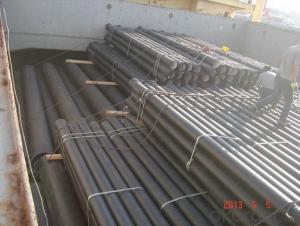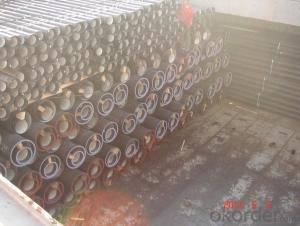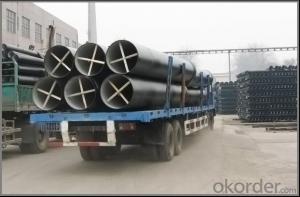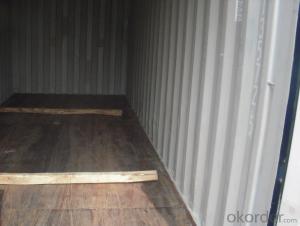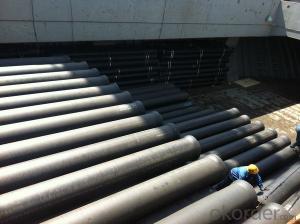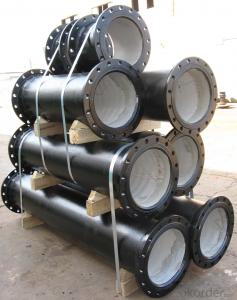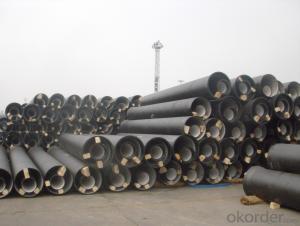DUCTILE IRON PIPES AND PIPE FITTINGS K8 CLASS DN450
- Loading Port:
- Tianjin
- Payment Terms:
- TT OR LC
- Min Order Qty:
- 22 pc
- Supply Capability:
- 3000 pc/month
OKorder Service Pledge
OKorder Financial Service
You Might Also Like
Material : Ductile Cast Iron
Size Range : DN 80mm to DN 2000mm
Unit Effective Length : 6m or 5.7m
Manufacture Standard: ISO 2531:1998/ EN 545:2006/EN 598:2007
Annual capacity : 200,000 tons
Coating Exterior: Zinc 130g/m2 according to ISO 8179-1 and bitumen coating 70 microns.
Cement Interior: Portland Cement/ High Alumina Cement/ Sulphate Resisting Cement Lining according to ISO 4179
Special requirements on external coating and internal lining can be applied
We also provide accessories such as SBR/EPDM rubber gaskets, lubricant paste, pipe caps, PE sleeves, etc.
Additional Parts:
Each pipe is strictly inspected according to related standard to ensure permanently high performance.
Easy Installation at site and service free for life
Long Service Lifespan
Quotation will arrive you within 24hours once we get your inquiry.
We guarantee offering you a competitive price.
A copy of original inspection reports of pipes will be offered after shipment.
Photos of loading process will be sent to the customer after shipment effect.
We will follow-up the delivery progress after shipment effect and update to the customer on weekly basis.
- Q: What is the expected burst pressure of ductile iron pipes?
- The expected burst pressure of ductile iron pipes can vary depending on various factors such as the pipe diameter, wall thickness, and the specific grade of ductile iron used. However, in general, ductile iron pipes typically have a burst pressure ranging from 350 to 700 psi (pounds per square inch).
- Q: Can ductile iron pipes be used in potable water systems?
- Yes, ductile iron pipes can be used in potable water systems. Ductile iron is a type of cast iron that has enhanced strength and ductility. It is a common material choice for water infrastructure, including potable water systems, due to its durability, resistance to corrosion, and long service life. Ductile iron pipes are manufactured to meet specific standards and regulations for potable water usage, ensuring that they are safe for transporting drinking water. Additionally, ductile iron pipes have excellent flow characteristics, making them suitable for water distribution systems. Overall, ductile iron pipes are a reliable and commonly used material in potable water systems.
- Q: How do ductile iron pipes perform in sandy soil conditions?
- Ductile iron pipes perform well in sandy soil conditions due to their inherent strength and durability. The material's high tensile strength allows it to withstand the pressure exerted by the surrounding soil, preventing pipe deformation and breakage. Additionally, the corrosion resistance of ductile iron ensures a longer lifespan, even in corrosive sandy soil environments.
- Q: What is cast iron pipe, specification for cast iron pipe?
- Ductile iron pipes are more expensive, but the production methods are different.
- Q: What is the expected thermal expansion of ductile iron pipes?
- Several factors, including the iron's composition, temperature range, and pipe length, can affect the expected thermal expansion of ductile iron pipes. Generally, these pipes have a coefficient of thermal expansion between 10 and 13 µin/in/°F. This implies that for every one degree Fahrenheit rise in temperature, the ductile iron pipe will expand by around 10 to 13 microinches per inch in length. It is worth mentioning that this estimation is approximate and may slightly differ based on the pipe's specific conditions and characteristics.
- Q: What is the K9 standard pressure for ductile iron pipes?
- Ductile iron pipe is a kind of cast iron. It is an alloy of iron, carbon and silicon. Graphite is exist in spherical form, usually graphite size is 6-7, casting spheroidization grade control requirements for 1-3 quality (spheroidization rate greater than 80%), so the mechanical properties of the material itself has been improved, has the essence of iron, steel performance.
- Q: Can cast iron pipes not be used for domestic water supply and drainage?
- Can be used for life drainage, I last year to do the public construction, 24 layers of life and drainage on the cast iron pipe.
- Q: What are the different types of thrust restraints for ductile iron pipe?
- Ductile iron pipe installations utilize various thrust restraints to prevent pipe movement or separation caused by internal pressure, external loads, or temperature changes. 1. Concrete thrust blocks are structures installed at bends, tees, and directional changes in the pipeline. Their purpose is to transfer thrust forces to the surrounding soil or foundation, effectively resisting pipe movement. 2. Mechanical restraints, such as tie rods or harnesses, are steel-based devices that apply external force to restrain the pipe. They can be adjusted to accommodate changes in pipe length or alignment. 3. Pipe anchors, made of steel, are installed at intervals along the pipeline to provide resistance against axial movement. These anchors are embedded into the surrounding soil or concrete, securing the pipe firmly. 4. Thrust collars, typically made of steel, encircle the pipe to prevent movement or separation. They are strategically placed along the pipeline to absorb thrust forces. 5. Restrained joint systems are specialized pipe joints designed to resist axial forces. They possess additional features like keyways or wedges, enhancing resistance against movement. Selecting the appropriate thrust restraint system for ductile iron pipe installations depends on factors such as pipe diameter, operating pressure, soil conditions, and potential external loads. Consulting with qualified engineers or pipe manufacturers ensures the proper selection and installation of thrust restraints.
- Q: What are the advantages of using ductile iron pipes over other materials?
- Using ductile iron pipes instead of other materials offers several advantages. To begin with, ductile iron pipes have a higher level of strength and durability compared to materials like PVC, HDPE, or concrete pipes. They possess a high tensile strength, enabling them to withstand greater pressure and handle heavy loads without cracking or breaking. This makes them suitable for a range of applications, including water and sewage systems, as well as industrial pipelines. Additionally, ductile iron pipes exhibit excellent resistance to corrosion. They typically feature a protective coating, such as zinc or epoxy, which prevents the formation of rust and extends their lifespan. This makes them ideal for underground installations or areas with aggressive soil conditions or corrosive substances. Furthermore, ductile iron pipes offer flexibility. They can be manufactured in various lengths, diameters, and angles, allowing for easy installation and adaptation to different project requirements. Moreover, their flexibility enables them to withstand ground movements, such as settlement or seismic activities, without causing significant damage. Moreover, ductile iron pipes have a smooth internal surface, which reduces friction and enhances flow efficiency. This results in reduced energy consumption for pumping systems and lower maintenance costs. Additionally, the smooth surface minimizes the risk of deposits or clogs, ensuring a consistent and uninterrupted flow of fluids. Lastly, ductile iron pipes boast a long service life. With proper installation and maintenance, they can last for over 100 years. This longevity not only reduces the need for frequent replacements but also provides a sustainable and cost-effective solution for infrastructure projects. In conclusion, the utilization of ductile iron pipes offers numerous advantages over other materials. These include superior strength, corrosion resistance, flexibility, a smooth internal surface, and a long service life. These qualities make them a reliable choice for various applications, providing efficient and durable solutions for water, sewage, and industrial pipelines.
- Q: How can the ductile iron pipe be welded?
- If the hole on the ductile iron pipe, you can use special hoop lined flexible rubber ring, rubber ring and pipe wall coating with rubber ring, glue to be fixed.
Send your message to us
DUCTILE IRON PIPES AND PIPE FITTINGS K8 CLASS DN450
- Loading Port:
- Tianjin
- Payment Terms:
- TT OR LC
- Min Order Qty:
- 22 pc
- Supply Capability:
- 3000 pc/month
OKorder Service Pledge
OKorder Financial Service
Similar products
Hot products
Hot Searches
Related keywords
